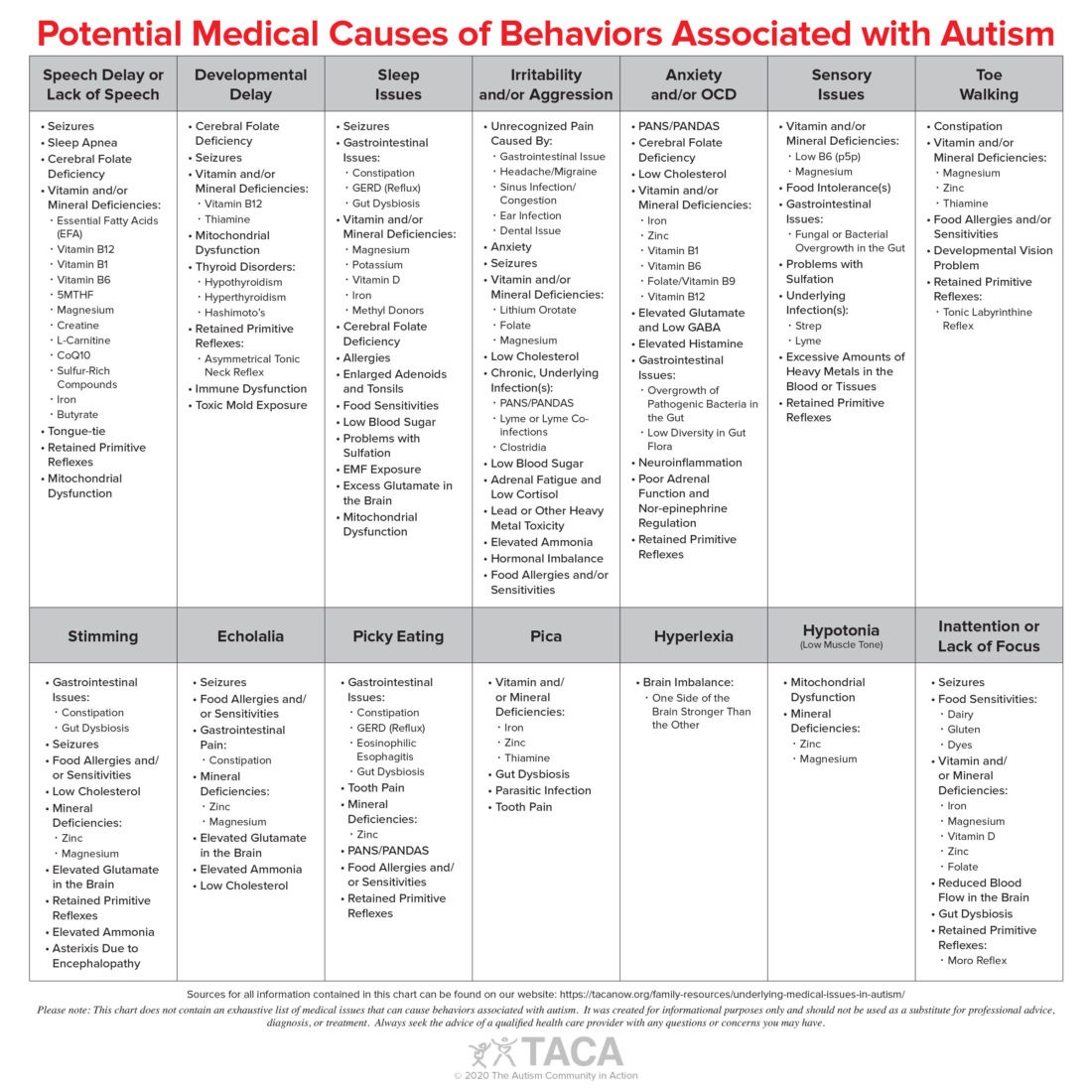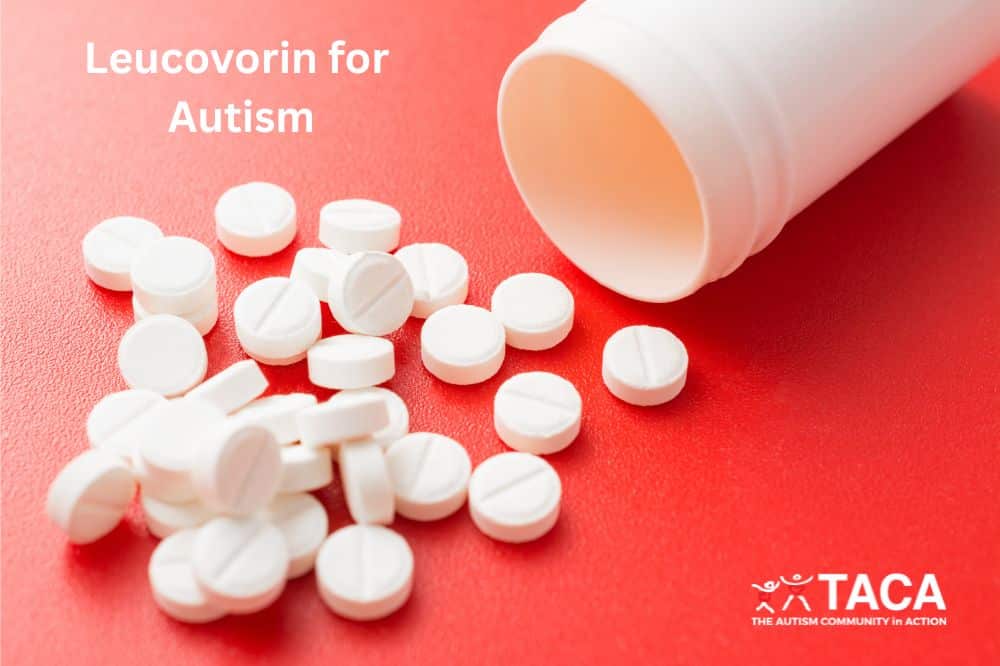Underlying Medical Issues in Autism

All contents of this resource were created for informational purposes only and are not intended to be a substitute for professional advice, diagnosis, or treatment. Always seek the advice of your physician, therapist, or other qualified health providers with any questions or concerns you may have.
Behavior is communication. Sometimes our kids with autism are communicating their medical issues to us through their behavior. Figuring out underlying medical causes requires patience, keen observation, and an experienced doctor who can help you with proper medical testing and guidance.
In this article, you will find a list of documented behaviors associated with autism that are sometimes caused by underlying medical issues. This is not a comprehensive list. Rather, this is a list of medical causes that should be considered when assessing and treating a child with the outlined behaviors.
Underlying Medical Issues that can Cause Behaviors Associated with Autism
The chart below outlines potential medical causes of behaviors that are associated with autism. Links to sources for the information found in this chart are provided below.

Speech Delay or Lack of Speech
Speech issues can be caused or exacerbated by various underlying medical issues. Some of these are listed below:
- Seizures
- Sleep apnea
- Cerebral Folate Deficiency
- Vitamin and/or Mineral Deficiencies:
- Tongue-tie
- Retained primitive reflexes
- Mitochondrial dysfunction
Developmental Delays
Developmental delay is a catch-all phrase for a child that is experiencing delays in skills such as gross and fine motor, socialization, communication, or cognitive skills. If your child gets this label, it is necessary to examine why this may be happening. There are numerous reasons for developmental delays in autism, including:
- Cerebral Folate Deficiency
- Seizures
- Vitamin/mineral deficiency
- B12 deficiency
- Thiamine deficiency
- Mitochondrial dysfunction
- Thyroid dysfunction (Hypothyroidism / Hyperthyroidism / Hashimoto’s)
- Retained primitive reflexes (specifically the asymmetrical tonic neck reflex)
- Immune dysfunction
- Toxic mold exposure
Sleep Problems
Over half of kids with autism have sleep issues. This is more than simply an inconvenience. It impacts the entire family’s health and happiness. Therefore, discovering what is causing the sleep problems can be life changing. Possible causes of sleep issues in autism include:
- Seizures
- Gastrointestinal issues:
- Vitamin and/or Mineral Deficiencies:
- Cerebral Folate Deficiency
- Problems with sulfation in the body
- Epsom salt baths might help
- Allergies
- Enlarged adenoids and tonsils
- Food sensitivities
- Low blood sugar
- EMF exposure
- Excess Glutamate in the Brain
- Mitochondrial dysfunction
Irritability/Aggression/Meltdowns
Intense mood swings that can sometimes result in injury to self or others, are frustrating at best and frightening at worst. There is no bigger example that behavior is communication. Finding the source of the problem is critical to stopping this behavior. Here is a list of potential culprits:
- Unrecognized pain caused by:
- GI issues, such as constipation
- Headaches, sinus pain, or migraines
- Dental issues
- Ear infections
- Anxiety
- Seizures
- Low levels of vitamins and minerals such as lithium orotate, folate, magnesium
- Low cholesterol
- Chronic underlying infection, such as Strep or Lyme or Lyme Co-infections
- PANS or PANDAS
- Clostridia
- Low blood sugar
- Adrenal fatigue and low cortisol
- Lead (or other heavy metal) toxicity
- Elevated ammonia
- Hormonal imbalance (excess androgens)
- Click here to read a great blog about a family who had success in addressing excess androgens
- Food allergies and/or sensitivities, (especially corn)
- Phenols and salicylates in food
Anxiety/OCD
Anxiety and Obsessive-Compulsive Disorder (OCD) are commonly seen in autism. This cycle of unwanted, intrusive thoughts is distressing for the person suffering and their loved ones watching them struggle. Thankfully, we know there are underlying issues that are treatable and can give the person suffering needed relief. Here is a short list of possibilities:
- PANS/PANDAS
- Cerebral Folate Deficiency
- Low cholesterol
- Vitamin and/or mineral deficiencies:
- Elevated glutamate and low GABA
- Gastrointestinal Issues:
- Elevated Histamine
- Neuroinflammation
- Poor adrenal function and norepinephrine regulation
- i.e. the body is stuck in fight or flight mode
- Retained primitive reflexes
Sensory Processing Issues:
Sensory Processing Dysfunction (SPD) refers to when the brain has trouble organizing information from the senses. Children with sensory processing issues can be over-sensitive or under-sensitive to sights, sounds, textures, flavors, smells and other sensory input. Here are some of the reasons that this happens:
- Low B6 (p5p) and magnesium
- Food intolerance
- Gastrointestinal issues, such as:
- Problems with sulfation
- Epsom salt baths might help
- An underlying infection, such as Strep or Lyme
- Excessive amounts of heavy metals in the blood or tissues
- Retained primitive reflexes
Toe Walking
Most people assume that toe walking in autism is simply due to Sensory Processing Disorder, however, when we look beyond that, we can see that there are often other issues at play. Here are some examples:
- Constipation
- Mineral deficiency (specifically magnesium and zinc)
- Thiamine deficiency
- Food sensitivities such as dairy or gluten
- Developmental vision problem
- Retained primitive reflex (tonic labyrinthine reflex)
Stimming
Self- stimulatory behavior (stimming) is sometimes called “stereotypic” behavior. Stimming usually refers to specific behaviors that include hand-flapping, rocking, spinning, or repetition of words and phrases.
Many kids or people with autism find stimming self-soothing, however there are also many medical reasons for it including:
- Gastrointestinal issues, such as:
- Seizures
- A reaction to the food the child is consuming
- Low cholesterol
- Low levels of minerals
- Elevated glutamate in the brain
- Retained primitive reflexes
- Elevated ammonia
- Asterixis due to encephalopathy
Echolalia
Echolalia is the repetition of phrases, words or parts of words. There are many possible medical reasons for it including:
- Seizures
- A reaction to the food the child is consuming
- Constipation or GI pain
- Low levels of minerals
- Elevated glutamate in the brain
- Elevated ammonia
- Low cholesterol
Picky Eating
If you have dealtwith a picky eater, you know it is not easy. Resolving feeding problems not only brings more nutritious foods into your life but also relieves a lot of anxiety. Here are some of the possible issues related to selective eating:
- Gastrointestinal issues, such as:
- Tooth pain
- Low minerals, specifically zinc
- PANS/PANDAS
- Food sensitivities
- Retained primitive reflexes
Pica
Pica is eating or chewing on non-food items. The medical issues listed below may be a cause or a result of Pica. Either way, they need to be addressed.
- Vitamin and/or mineral deficiencies, such as:
- Fungal overgrowth in the gut
- Parasitic infection
- Tooth pain
Hyperlexia
Hyperlexia is an above normal ability to read coupled with a below normal ability to understand spoken language, which can be caused by:
Hypotonia (Low Muscle Tone)
A state of low muscle tone (the amount of tension or resistance to stretch in a muscle), often involving reduced muscle strength. Hypotonia can be attributed to:
Inattention or Lack of Focus
Inattention is found often in autism and can be a frustrating thing to witness. The good news is that it can sometimes be remedied by addressing the medical issues listed below:
- Seizures
- Food sensitivities
- Dairy
- Gluten
- Food dyes
- Essential fatty acid deficiency
- Vitamin or mineral deficiency
- Iron
- Magnesium
- Vitamin D
- Zinc
- Folate
- Reduced blood flow in the brain
- Fungal or bacterial overgrowth in the gut
- Retained primitive reflexes (specifically the moro reflex for impulse control)
Treating Underlying Medical Issues in Autism

As you can see from the information above, there is an overlap between the symptoms of autism and a variety of medical disorders. The good news is that these underlying medical issues are treatable.
Examples of treatable underlying conditions include:
- Gastrointestinal issues
- Cerebral Folate Deficiency
- Seizures
- Mitochondrial dysfunction
- Food allergies and food sensitivities
- PANS and PANDAS
- B12 Deficiency
- Elevated glutamate
- Adrenal fatigue
Conclusion
While this information may seem overwhelming, it is important to know there is hope.
When underlying medical issues in autism are properly treated, many associated symptoms (which impair and challenge your child in their daily life) decrease or even disappear altogether, significantly improving their outcome and quality of life. In short, autism is treatable!
Additionally, combining medical treatment and therapies is the most effective and fastest route to progress. Kids who are healthy and happy have an increased ability to learn and develop new skills. As your child expands their repertoire of skills, they become more independent, which improves their confidence and self-esteem.
A happy, healthy, and independent child are our ultimate goals for your family. We love our kids. We want to see their personalities shine.
Additional Resources
- An Introduction to Medical Interventions for Autism
- Finding a Doctor
- Lab Testing
- Introduction to the Gluten-Free, Casein-Free, Soy-Free Diet
- Summary of Dietary, Nutritional, and Medical Treatments for Autism
- Simplified Approach for Biomedical Treatment of ASD by Dr. Rossignol
- Autism Checklists and Downloads




